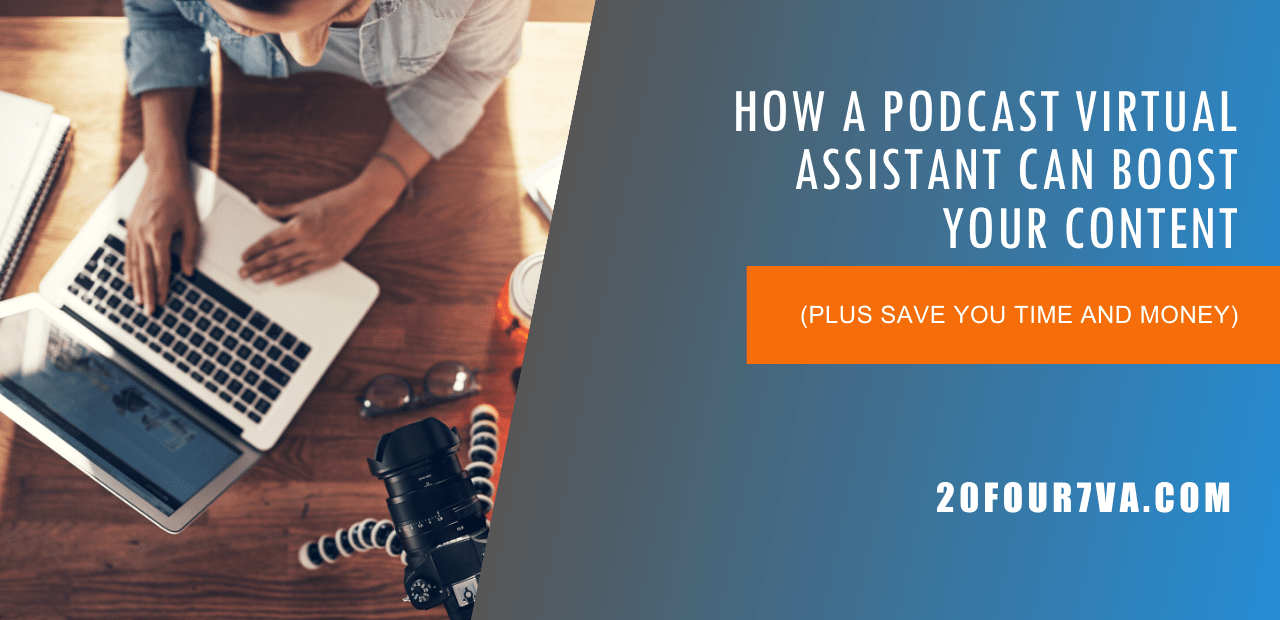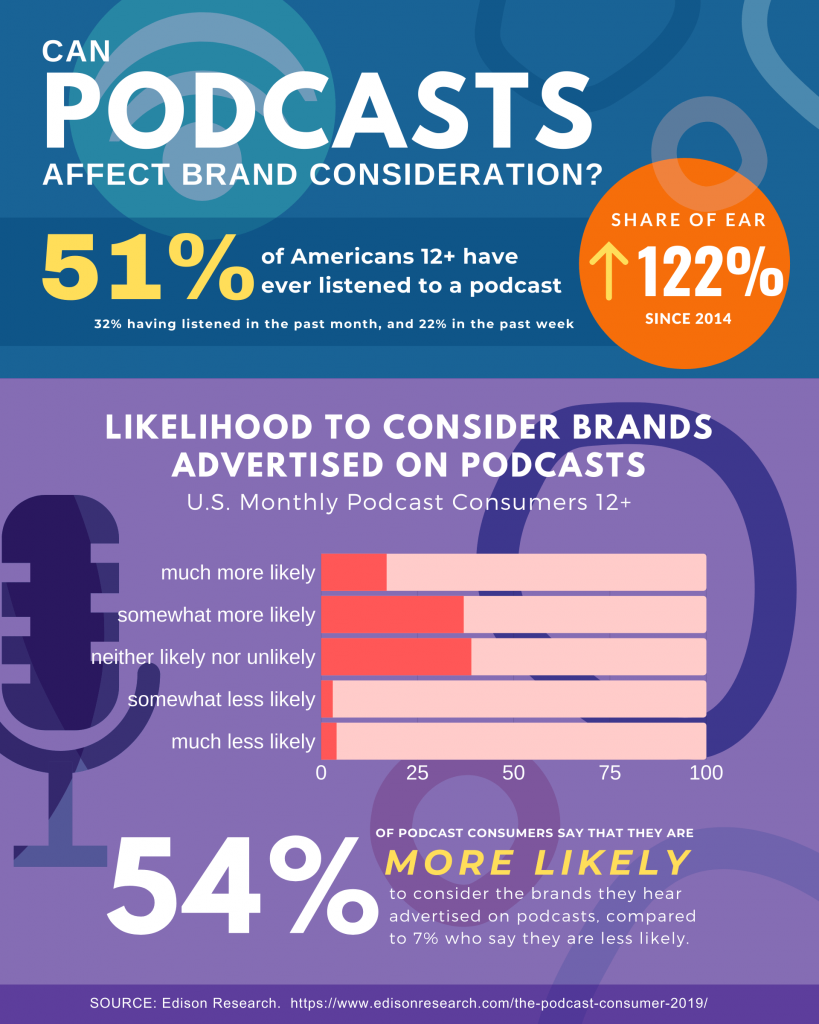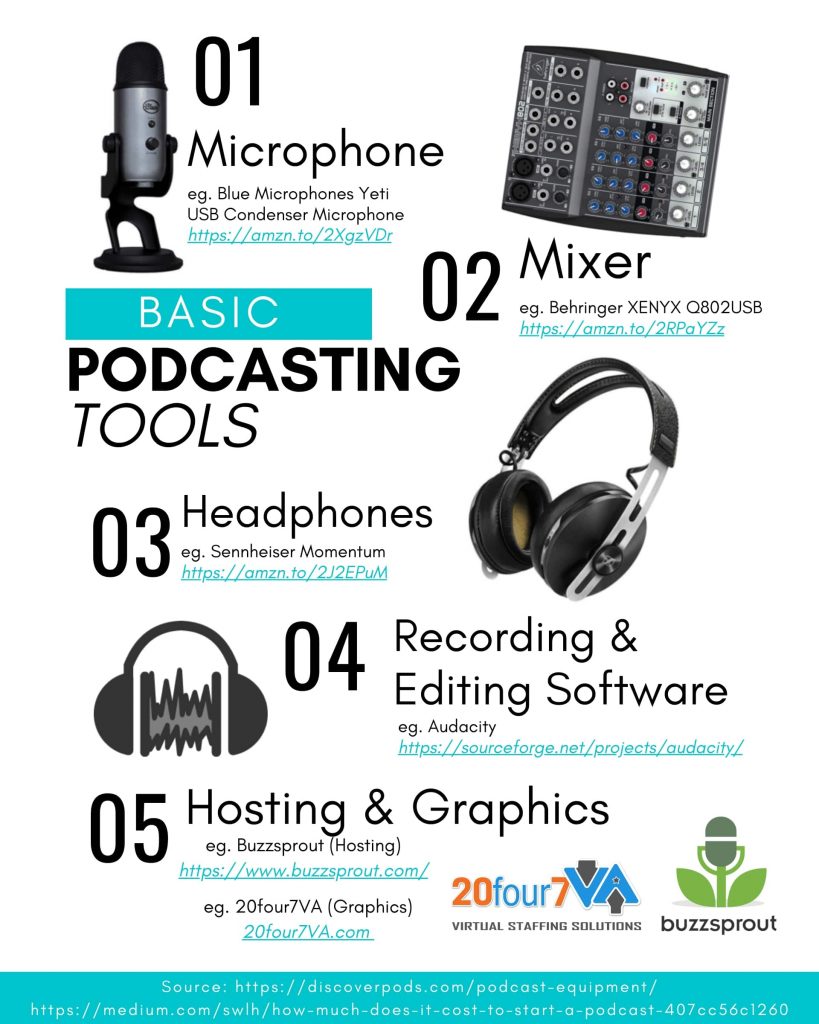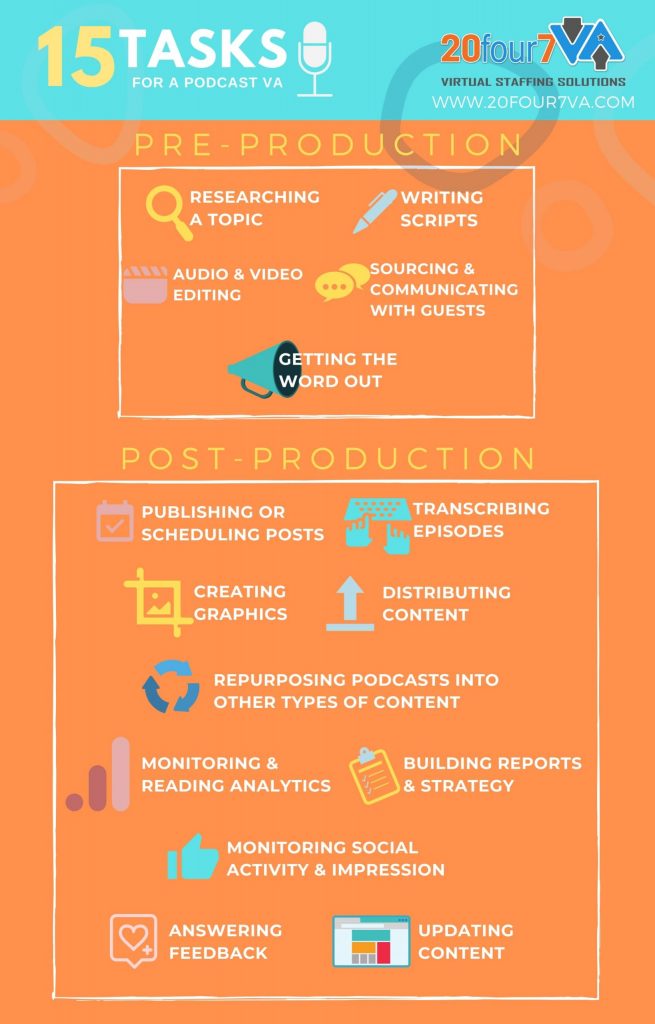How a Podcast Virtual Assistant Can Boost Your Content

With a third of the US population tuning in to a podcast at least once a month, podcasting is truly becoming a profitable online business. After all, it’s a great way to promote a brand, share business expertise, and connect with industry leaders and influencers. But like any other business, podcasting must be approached strategically. Whether you already have a podcast or are just preparing to start one, having a podcast virtual assistant can boost your content and productivity by leaps and bounds.
Podcasting for Business: What You Need to Know
Podcasting used to be just another way to repurpose high-impact content. But as listeners increased by the millions, it has steadily become a strong medium all on its own. According to a study by Edison Research, 54% of consumers are likely to consider a brand that they hear about in a podcast. This finding only fortifies the business and marketing potential of podcasting.

While launching a profitable podcast is exciting at first, it can quickly get overwhelming after some time. You may be buzzing with ideas on what to discuss in your episodes, but the logistics and technical component of podcasting can be very challenging. If you’re not careful, you’ll be spending more time and money than you need to!
To avoid burnout and overspending, it’s always good to tackle the task step by step and work with a podcast assistant or production assistant. Taking care of the basics would also help you determine the specific areas where you need virtual assistance the most.
Here are 6 questions you need to consider to help you start, promote, and eventually host a profitable podcast:
- What is the goal of my podcast? Are you in it to share industry expertise and insight? Do you have a tried-and-tested business approach you want to share with like-minded listeners?
- What topics will I talk about? While your line of business will most likely be the theme of your podcast, you still need to outline specific episode topics and subtopics. This should also help you decide which guests to invite and what questions to anticipate.
- Who are my listeners? Knowing your target audience will help you in curating your content and promoting your podcast.
- How long will one episode last? The average podcast usually lasts between 25-45 minutes. You must also decide how often to publish an episode.
- Where can people find me? For startups and newbie podcasters, WordPress offers great podcast-related plugins to get you started.
- What equipment do I need? The quality of your equipment would greatly impact the quality of your podcast.
To give you an idea, here are the basic tools you need to produce a podcast.

- Microphone – average microphones for podcasting cost between $129 – $150. Of course, you can always start with a simple but great sounding one and upgrade as you start earning from your podcast.
- Mixer – mixers are not necessary to record a podcast, but they greatly boost the quality of each podcast episode. Mixers are ideal if you’re recording multiple people or types of audio. An entry-level mixer, which costs around $88, can be used for interviewing guests.
- Headphones – you can monitor audio quality while recording if your mic has an output for headphones. However, you can go for higher tier headphones if you want a more advanced post-production edit. These can cost between $100-150.
- Recording and Editing Software – Audacity is free software with basic editing tools. If you want to go beyond the basics, however, software like Pro Tools First ($24/month) and Hindenberg Journalist ($95) has a wider range of editing and recording features. Another popular tool is Adobe Audition ($20.99/month)), which is one of those digital audio workstations that allow you to record, edit, and mix sounds and even restore audio.
- Hosting and graphics – After recording and editing a podcast, you need to consider how to share it with your audience. Websites like Simplecast, Podbean, and Buzzsprout have monthly plans between $10-$15 with enough storage space for starting podcasters. Apart from a customized web space for your show, these hosting sites also offer analytics tools for monitoring content. It’s essential to have a graphic designer craft a logo for your podcast so that people can recognize and remember it easily. As you publish episodes, you would also need other types of graphics like quote cards and social media images to promote your show. According to Piktochart, the hourly rates of a graphic designer can range between $20-$150 depending on their experience or task at hand.
Considering these figures, it should cost you around $400 to produce and publish a podcast episode on your own. Succeeding episodes might cost less because some of the expenses listed above are one-off purchases, but they can still be pretty costly.
Remember that these just take care of the basics. If you want to make a dent in your niche, create a buzz in your industry, and be heard by as many listeners as possible, you must invest accordingly. Fortunately, this doesn’t mean putting in more hours and shelling out way too much money. Investing can be as simple as working with a podcasting virtual assistant.
[activecampaign form=68]
How a Podcasting Virtual Assistant Helps
Why should you hire a virtual assistant? A podcast virtual assistant knows the ins and outs of the craft. You can count on their experience to be valuable when it comes to pre-and post-production tasks. Also, as a specialist in the field, a podcast production virtual assistant is likely to have access to the tools and software needed to produce quality content.
Apart from the niche expertise they bring to the table, podcast VAs, like any type of VA, come with an ideal work setup. You can choose the schedule and duration of your working relationship, minus the groundwork and costs that come with traditional employment. You can also work with a VA specializing in tasks you need the most help with.
15 Tasks You Should Outsource to a Podcast Virtual Assistant

Keep your focus and energy on high-impact responsibilities and let your podcasting VA do the rest. Here are 15 things you can outsource to a podcast virtual assistant.
Pre-production
- Researching a topic
You’d be surprised by how many hours you can spend on research. Even with topics, you’re familiar with, extensive research can be gruelling. Delegate research and fact-checking to your podcast VA so you can focus on making executive decisions. - Writing scripts
Organize ideas so you can move through an episode with ease. Then, hand them over to your VA so they can write scripts for you to read or use as guidelines. Podcast VAs know how to paint pictures with words or write scripts that sound natural. Scripts would also keep you on track so you don’t veer from the topic or go overtime. - Audio and Video Editing
Stabilizing sounds, cropping out filler words and dead air, deleting background noise, ensuring video and audio continuity – these post-production tasks may be basic but they can end up horribly in inexperienced hands. Save time, money, and trouble when you let a podcast editor take care of these tasks.
TIP: Gauge the technical know-how of VAs before hiring them by listening or watching clips of their previous work. - Sourcing and communicating with guests
Which industry expert is most qualified to talk about your next topic? Who is currently the trendiest social influencer in your niche? Have your podcast assistant research about prospective guests. Your VA should also reach out to them, schedule appointments, and ensure you and your guest have all the data you need before recording. - Getting the word out
Get your target audience excited to listen to your podcast! Have your podcast assistant create stories for your social media accounts or send a shoutout to your email subscribers before publishing new episodes. Apart from rousing excitement and interest to your upcoming podcast, announcing it on social media and email will drive traffic to your website and lead to downloads for when you finally release it.
Post-production
- Publishing or scheduling posts
After recording and editing, your VA should take care of publishing or scheduling your podcasts for posting. Delegating this task also ensures your podcasts are published across multiple platforms on time. - Transcribing episodes
Transcribing your shows attract more followers and help the audience appreciate the depth of each episode. Through transcription, your podcasts are made accessible to people with impaired hearing. Some non-native English speakers might also appreciate your shows more if they can read their transcript while listening. - Creating graphics
Logos can be created before launching your podcast, as it helps give your channel or brand identity. Because podcasts with logos stand out, it helps people recognize you from other podcasters. Every episode you produce should also be released with accompanying graphics. This could be social media posts, blog images, and infographics that you can publish to promote episodes. They could be quote cards that you can post in your blog or website that people can Retweet or share in other platforms. Graphics make people appreciate and understand your content better. - Distributing content
Do you have various web properties? Posting from one platform to another could be a pain. Tools like Hootsuite would help you post on various platforms at the same time. Your podcast VA can schedule posts using such tools so more people can discover your podcast. You can also have your VA repost previous posts if it tackles a currently relevant issue. - Repurposing podcasts into other types of content
Some content just has higher engagement than others. Optimize these episodes by repurposing them into blog posts, infographics, quote cards, webinars, or even ebooks. Turning your podcast into other types of content makes it accessible to more audiences. - Monitoring and reading analytics
Most hosting sites for podcasts come with an analytics feature. Podcasting virtual assistants can interpret and simplify these statistics so you can see how your show fared with the audience. - Building reports and strategy
Analytics from your podcast hosting site, blog, and social media stores great clues as to what engages and moves your audience. Have your podcast VA create reports from the different platforms you use for sharing your podcast. With your VA’s insight, you can build a strategy on how to make your podcast more influential. You can also use data from these reports to pool content ideas for future episodes. - Monitoring social activity and impression
Podcast VAs have a grip on the social pulse, which is a great asset when looking for what’s hot in the podcasting universe. You can also require your VA to tune in to industry news or eavesdrop on social media to find out what people are saying about your posts. Monitoring social activity and industry news is a great way to come up with relevant ideas for future podcasts, understand your audience, and better your strategy. - Answering feedback
Remember that podcasting is another way for your brand to reach more people. Have your VA monitor and appropriately respond to comments or direct messages in your website, social media, or email. Engaging with the audience strengthens your online presence, strengthens your connections, and encourages them to continue supporting your podcast. - Updating content
If you’ve published episodes with outdated content, it’s only fitting to have them sorted out. This could be a product or business info that needs to be updated or a social event with significant changes. Have your VA update content by editing the text or post that comes with your podcast. You may not necessarily have to record the episode again, but a disclaimer or an edited post will warn the audience regarding the changes.
Conclusion
Working with a podcast virtual assistant will be one of the best investments you can make. They know how to source the most relevant ideas for your podcast, optimize the high-impact ones, and eventually turn your channel into an authority. They have the technical skills and know-how for the right tools and strategy to use, so you don’t have to waste time or money over guesswork. Best of all, they’re a very cost-effective solution to your staffing vs budget dilemma.
Podcasting should be a fun, exciting way for you to introduce your brand to the world while meeting fellow innovators and game-changers. Don’t let the work that goes into it keep you from enjoying this opportunity! Work with a podcasting virtual assistant through 20four7VA today.
[activecampaign form=68]
Recommended Reading: 30 Tasks for Your Graphic Designer Virtual Assistant












Great article and infographics